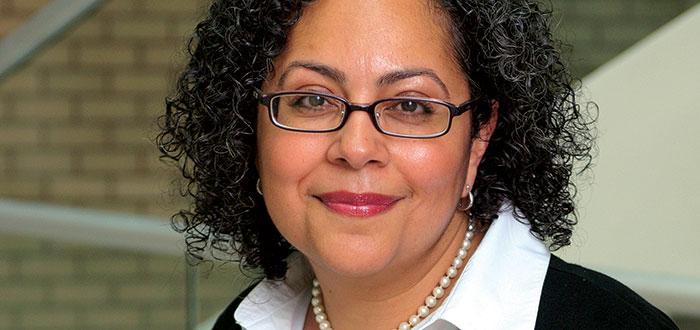Fordham Law Professor Tanya Hernandez shared excerpts from her upcoming book on multiracialism and civil rights in talk sponsored by the Center on Race, Law & Justice’s Colloquium on Race and Ethnicity on November 17, not quite seven months shy of the 50th anniversary of the Supreme Court’s unanimous decision in Loving v. Virginia, which invalidated laws prohibiting interracial marriage and the legal stigma against mixed-race children.
Hernandez outlined the argument presented in her work-in-progress study of multiracial identity in discrimination lawsuits, tentatively titled Multiracials and Civil Rights. In the book, Hernandez challenges conventional wisdom about multiracial discrimination.
“The growing view that discrimination against multiracial (racially-mixed) people poses a distinctive challenge to racial equality law is incorrect,” she said. “This misperception is based on the false presumption that multiracials experience racial discrimination in a unique manner that makes it necessary to reconsider civil rights law.”
Hernandez’s close examination of many multiracial discrimination legal cases in a variety of equality law contexts demonstrates the fallacy and danger of that presumption. The cases frequently describe acts of discrimination accompanied by pointed, derogatory comments about non-whiteness—and blackness in particular. The overarching commonality is the exceptionalism of blackness and non-whiteness, rather than multiraciality, as problematic. Although the complainants may personally identify as multiracial, they present allegations of public discrimination rooted in a specific non-white and black bias that is not novel or particular to mixed-race persons.
“The cases demonstrate the enduring problem of non-whiteness in any form,” said Hernandez. “Bias is not about the racial mix itself, but rather about the fact that part of the mix is black. This insight is lost in the midst of multiracial-identity scholars’ singular focus on promoting mixed-race identity.”
Hernandez’s book, slated for publication by NYU Press, investigates the phenomenon of multiracial identity in civil rights cases across the issues of employment, housing, education, and public accommodations. It elucidates the distinction between the presumed exceptional space that multiracial persons are rhetorically imagined to occupy in the public discourse and the binary non-white/white racial realities that they actually experience.
The book posits that multiracial discrimination cases are helpful in highlighting the continued need for attention to racial privilege and for fortifying the focus of civil rights law on racial hierarchy and the lingering legacy of anti-black bias. The cases also demonstrate how representations of racial mixture as “exotic” can be a distraction from the actual dynamics of discrimination that the law needs to address to pursue substantive equality.
The forthcoming book, Hernandez’s second, builds on themes central to her career as a legal scholar. In her book Racial Subordination in Latin America: The Role of State, Customary Law, and the New Civil Rights Response, Hernandez explored racial regulation laws within Latin American countries. She has studied comparative race relations and antidiscrimination law for over 25 years.
Hernandez expressed hopes that her latest work would reach outside the boundaries of legal academia to create a dialogue with her colleagues in the social sciences and the public at large.
“It’s very much my hope that much of what we do here at the Center on Race, Law & Justice will reach an interdisciplinary audience, and people who are concerned about the intersection between race and law, but who are not necessarily law-trained themselves, will join the conversation,” she said.




